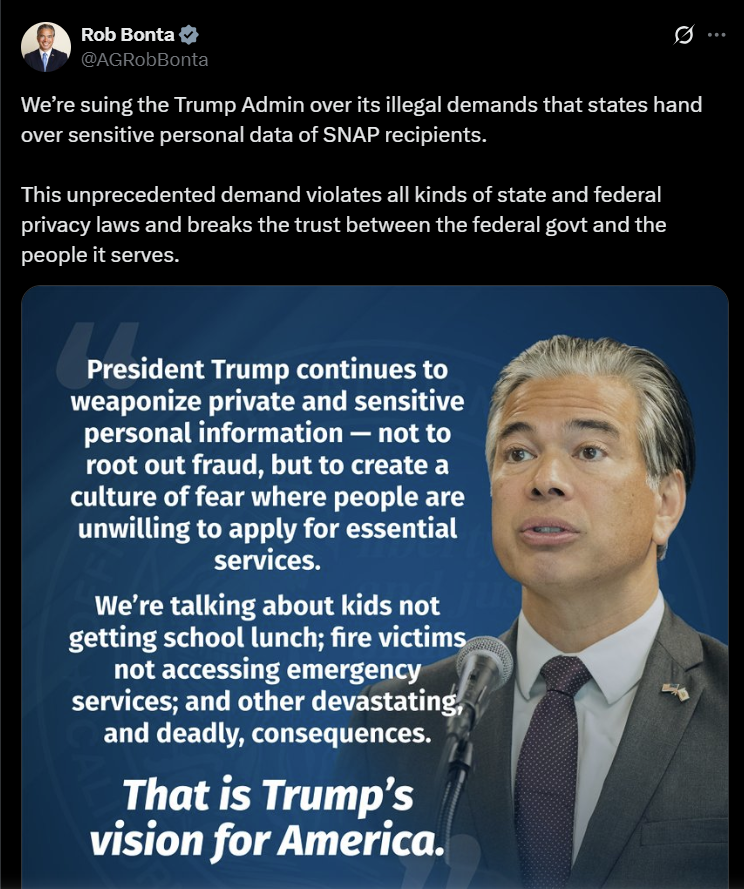California News:
Attorney General Rob Bonta announced Monday that the state of California, along with 20 other state Attorneys General, will sue the U.S. Department of Agriculture over a compliance order to give all Supplemental Nutrition Assistance Program (SNAP) records, including what the immigration status of beneficiaries and the household members are.
“President Trump continues to weaponize private and sensitive personal information — not to root out fraud, but to create a culture of fear where people are unwilling to apply for essential services,” Bonta said in a statement Monday. “We’re talking about kids not getting school lunch; fire victims not accessing emergency services; and other devastating, and deadly, consequences. That is Trump’s vision for America. This unprecedented demand that states turn over SNAP data violates all kinds of state and federal privacy laws and further breaks the trust between the federal government and the people it serves. The President doesn’t get to change the rules in the middle of the game, no matter how much he may want to. While he may be comfortable breaking promises to the American people, California is not. We will not comply with this illegal demand. We’ll see the President in court.”
The issue dates back to March when President Donald Trump signed Executive Order 14243. According to the order, all agency heads are to take all necessary steps, to the maximum extent consistent with law, to ensure the Federal Government has unfettered access to comprehensive data from all state programs that receive federal funding, including data generated by those programs but maintained in third-party databases.
In May, the USDA invoked this order, ordering all state to give the following data starting from January 1, 2020:
- Records sufficient to identify individuals as applicants for, or recipients of, SNAP benefits, including but not limited to personally identifiable information in the form of names, dates of birth, personal addresses used, and Social Security numbers.
- Records sufficient to calculate the total dollar value of SNAP benefits received by participants over time, with the ability to filter benefits received by date ranges.
This order, with a comply by date of July 30th, rattled many states, especially with the threat that they risk all federal SNAP funding as a result. However, it wasn’t until last week when many started to act out. On July 23rd, the USDA expanded the demand to include more data points, including “verifying immigration status eligibility”. This led nearly a dozen states to join in on the lawsuit on Monday.
Bonta’s latest lawsuit
According to the suit, California will be joined by the Attorneys General of Arizona, Colorado, Connecticut, Delaware, Hawaii, Illinois, Kentucky, Maine, Maryland, Massachusetts, Michigan, Minnesota, Nevada, New Jersey, New Mexico, New York, Oregon, Rhode Island, Washington, and Wisconsin, as well as the District of Columbia. The U.S. District Court suit states that the information would be used to “further President Trump’s Agenda” and that the order is illegal. Amongst other things, they noted that it violated multiple federal privacy laws, it exceeded USDA’s statutory authority, and it violates the Spending Clause of the U.S. Constitution.
“The purpose of what the Trump administration is doing here is to target immigrant communities,” added Michigan Attorney General Dana Nessel. “Trump’s actions send a chilling effect to American citizens, and to tell them that if they apply for programs that they are perfectly entitled to under law, their most personal and sensitive data is going to be shared with all kinds of people, and it’s going to have the impact, and I think it already is, of scaring people away from seeking these increased incredibly important programs.”
Should California not comply by Wednesday, the state risks losing $1.3 billion of annual federal funding towards the CalFresh program, which is California’s food stamp program. As the state spends $12 billion a year on the program, a loss of $1.3 billion would amount to a major funding gap. Many parts of the state are already dealing with less CalFresh funding coming in and the pulling of many residents off benefits as well because of the recently passed federal budget slashing funding.
13% of people who live in the state currently receive CalFresh benefits, with illegal immigrants not eligible to receive benefits. However, they can still get funding from other programs, with CalFresh allowing people to still apply for benefits even if a household member is undocumented. This must be listed, and thus, would be readily seen by the federal government under the USDA data demands.
As of Monday afternoon, the U.S. Department of Justice has yet to respond to the lawsuit, but are expected to challenge it in District Court.
Click this link for the original source of this article.
Author: Evan Symon
This content is courtesy of, and owned and copyrighted by, https://californiaglobe.com and its author. This content is made available by use of the public RSS feed offered by the host site and is used for educational purposes only. If you are the author or represent the host site and would like this content removed now and in the future, please contact USSANews.com using the email address in the Contact page found in the website menu.





